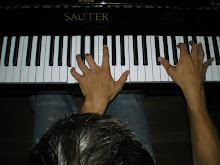"To me, atonality is against nature. There is a centre to everything that exists. The planets have the sun, the moon [has] the earth. The reason I like Oriental music is because everything has a firm centre. All music with a centre is tonal. Music without a centre is fine for a minute or two, but it soon sounds all the same"
So I may be critical, but i agree with the man who wrote those words ( minus those celestial and mystical connotations). It is against nature, yes, but that does not deny atonality artistic merit. What does it in for me is the dogma... that and.... it all sounds the same. (sometimes)
But i'll save my rant against atonality for another day... a day when im a little more comfortable with making audacious claims. Hovhaness at least realized the problem with his enormous output- the issue of quality. "I write too much, far too much (55 symphonies). This is my insanity, and new music is not published" He ended up writing 12 more symphonies. Why he chose to write so much is beyond me. He clearly understood the problem, but worked and worked all the same.
"My purpose is to create music not for snobs, but for all people, music which is beautiful and healing. To attempt what old Chinese painters called 'spirit resonance' in melody and sound."
It would not be a stretch to see this as a post-modern attitude, or see his works as anticipating post-modernism. His facination with the east links him to other west-coast american composers, Cage and Harrison, and several critics have already written that he anticipated minimalism and new-age as well as the latter-day mysticism of pomos like Arvo Part. He even played with Indian ragas before Glass and others made it fashionable. Good for him, i say.
Lahti
2 years ago

No comments:
Post a Comment